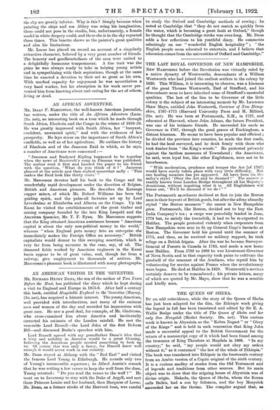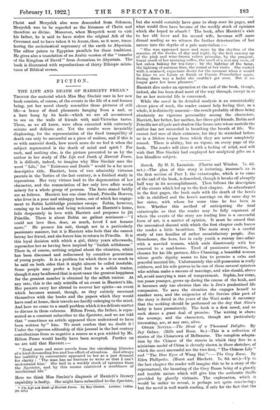THE QUEEN OF SHEBA.
BY an odd coincidence, while the story of the Queen of Sheba has just been adapted for the film, the Ethiopic work giving the legend in full has been translated and edited by Sir E. A. Wallis Budge under the title of The Queen of Sheba and her only Son Menyelek (Medici Society. 30s. net). This curious work is known in Abyssinia as the " Kebra Nagast " or "Glory of the Kings" and is held in such veneration that King John made a successful appeal to the British Government for the return of a manuscript copy of it which had been found among the treasures of King Theodore at Magdala in 1868. "In my country," he said, "my people would not obey my orders without it," as it contained "the law of the whole of Ethiopia." The book was translated into Ethipoie in the fourteenth century from an Arabic version of a Coptic original of the sixth century. It is a curious medley of stories from the Old Testament and of legends and traditions from other sources. But its main object was to show that the reigning house of Abyssinia was of divine origin. Makeda, the Queen of Sheba, whom the Koran calls Balkis, had a son by Solomon, and the boy Menyelek succeeded her on the throne. The compiler argued that, as Christ and Menyelek also were descended from Solomon, Menyelek was to be regarded as the kinsman of Christ and therefore as divine. Moreover, when Menyelek went to visit his father, he is said to have stolen the original Ark of the Covenant and to have taken it to Axum, thus, as it were, trans- ferring the ecclesiastical supremacy of the earth to Abyssinia. The editor points to Egyptian parallels for these traditions. He gives also a translation of an Arabic version of the "transfer of the Kingdom of David" from Jerusalem to Abyssinia. The book is illustrated with reproductions of thirty Ethiopic minia- tures of Biblical scenes.



































 Previous page
Previous page